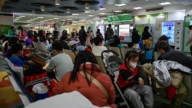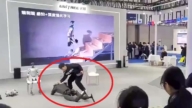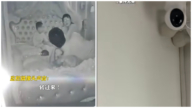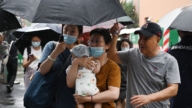【新唐人2013年06月24日讯】最近英国杂志《泰晤士高等教育增刊》(The Times Higher Education Supplement)公布了2013年“全球最具潜力”百所大学排行榜,其中韩国和香港都有大学进入前10名,但中国大陆竟然没有一所大学上榜。据专业人士指出,大陆院校因为受政府和中共控制,没有独立精神和自由思想,可以说,中国没有真正的大学,只有“党校”。
19号,《泰晤士高等教育增刊》公布:“2013年全球100所最具潜力大学”排行榜,位列前10名的大学排名,依次为:韩国浦项科技大学、瑞士洛桑联邦理工学院、韩国高等科学技术学院、香港科技大学、美国加州大学尔湾分校、荷兰马斯垂克大学、英国约克大学、新加坡南洋理工大学、巴黎第六大学、巴黎第十一大学。
这一排行榜针对的是,建校历史少于50年的大学,一些历史悠久的老牌名校,不在评选范围之内。评选的主要依据是学校的13项指标,包括创新能力、教学质量、研究成果、论文被引用次数和国际声誉等。这次评选结果显示,亚洲大学特别是韩国大学迅速崛起,令人瞩目。
在百名排行榜中,香港有4所大学上榜,台湾有5所大学上榜。韩国则有两所大学进入前10名,其中韩国浦项科技大学连续两年位列榜首。而对比鲜明的是,中国大陆竟然没有一所高校上榜。
近年来,中国大陆大搞教育产业化,学生人数猛增,大学城遍地,科研经费也大幅增加,但,为何仍不被世界认同呢?
对此,旅居澳洲的原“首都师范大学”教育科学学院副教授李元华指出,大陆当局推行的教育政策,直接把大学堕落为赚钱的工具。
旅澳原首都师范大学教育科学学院副教授李元华:“就是因为它整个环境是被污染的,是一个被中共把持、被污染的一个环境,所以教师没有学术自由,办学理念不是以培养人和做学术研究为目地的。”
李元华谈到,大陆学术界受整个社会风气影响,盛行弄虚作假、利益交换,而真正有学术追求的人却被排挤。
李元华:“学术界也像中共政府一样,贪污腐败盛行,所以它也是在搞利益交换。而并不考虑,谁的科研研究可能对科学事业有发展,我们要支持他,已经没有这样的人了,或者很少有这样的人了。”
北京“理工大学”经济学教授胡星斗则直言:中国大陆并没有真正意义上的大学。
北京理工大学经济学教授胡星斗:“中国的大学严格意义上来说都是党校。真正意义上的大学必须是独立的。它要政校分开,政府与学校要分开,这样才能称其为真正的大学,否则它只是行政机关的延伸。”
美国某研究所从事研究的博士杰森•马也谈到,中国高校实际上是官本位的,当教授远远没有当官实惠,这使得很多有能力的科研人员很快走上仕途,不再深入做研究。
美国某研究所博士杰森•马:“这种官本位的方式,很多时候研究方向也是由一些不一定懂研究的官在定,这造成了整个研究人员的流失和研究项目策定很多有政治因素在里头,所以研究项目的设立不科学。”
杰森强调,这一切归根结底还是社会体系问题,很多中国科研人员在国外取得许多成果,而在大陆却无法施展才华。杰森还指出,中共的体制会在社会方方面面产生腐朽,这自然导致高校铜臭味和官本位泛滥,严重压抑了科研人员的创造性。
采访/易如 编辑/李谦 后制/李智远
China is absent from world university rankings
The 2013 Times Higher Educations 100 universities under
50 ranks young universities with great potential.
Both Korea and Hong Kong universities scored high
in the rankings. China, however, is missing.
Experts indicate that universities in China are controlled
by the state and the Communist Party and thus lack independence and freedom.
In other words, under the current regime, China lacks
genuine universities, and only has Party universities.
Times Higher Education published on the 19th
“The 100 universities under 50 2013.”
The top 10 universities are Pohang University of
Science and Technology, South Korea;
École Polytechnique Fédérale de Lausanne, Switzerland;
Korea Advanced Institute of Science and Technology,
South Korea;
Hong Kong University of Science and Technology,
Hong Kong;
University of California, Irvine, United States;
Maastricht University, Netherlands;
University of York, United Kingdom;
Nanyang Technological University, Singapore;
Université Pierre et Marie Curie, France;
Université Paris-Sud, France.
According to the Times Higher Education, “100 Under 50
is a ranking of the top 100 universities under 50 years old,
“not those institutions with centuries of history."
“Selection was based primarily on the school’s 13 indicators,
including innovation, quality of teaching, research,
papers cited and international reputation.
The evaluation results show that remarkably Asian
universities, Korean universities have risen rapidly."
Out of the 100 universities, four are from Hong Kong
and five from Taiwan.
Two Korean universities made to the top 10 list.
Pohang University of Science and Technology,
South Korea, tops the rankings for two consecutive years.
In contrast, China is missing from the list.
China has industrialized education in recent years.
The soaring number of students, university towns,
and research budget made no impression to the world. But why?
Former professor of Capital Normal University, Li Yuanhua,
indicates that the current regime education policy
has turned higher education into money-making tools.
Li Yuanhua, former professor of Capital Normal University:
“The entire system is polluted and controlled
by the Communist regime.
There is no academic freedom.
The mission is not about education or research."
Li Yuanhua says that the prevailing fraud and pursuit
of money is filling academia.
People with a true academic spirit are marginalized.
Li Yuanhua: “Academia, just like the Communist regime,
is now filled with corruption.
It is not about research, but money making.
Research is no longer about advancing science.
Very few people care about real research."
Beijing Institute of Technology professor of economics,
Hu Xingdou says it bluntly, “There is no genuine university in China."
Beijing Institute of Technology economics professor
Hu Xingdou: “In a strict sense, all Chinese universities are party schools.
A genuine university should be independent from politics.
Otherwise, the university will only become an extension
of the government."
Dr. Jason Ma, a researcher from the US says that higher
education in China is about politics.
Being a professor is not as useful as a position
in the government.
Many high caliber researchers have given up on research
but engage in governmental business.
Jason Ma, a Ph.D. researcher at the US: “Often the research
is determined by officials who don’t really know research.
The political element has caused the loss of researchers.
Projects are also determined in a non-scientific manner."
Jason stresses the social system is the root of the problem.
Many achieving Chinese researchers from abroad
have nowhere to go in China.
The social system under the Communist regime has decayed
so much that even universities cannot avoid being influenced.
Money going and governmental interference have seriously
suppressed the creativity of the researchers.






























